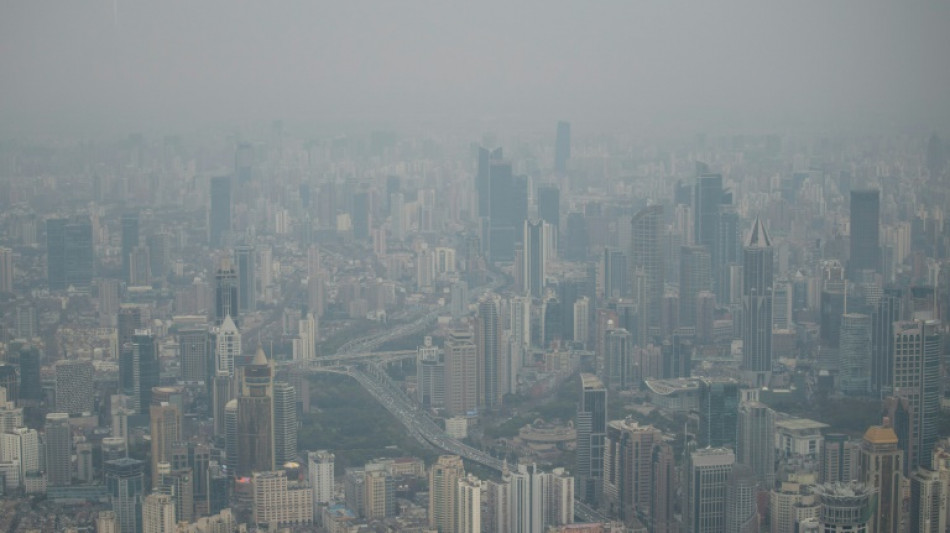
-
 Spanish singer Julio Iglesias prepares defence against abuse allegations: Hola! magazine
Spanish singer Julio Iglesias prepares defence against abuse allegations: Hola! magazine
-
Actor McConaughey seeks to patent image to protect from AI

-
 Musk's Grok barred from undressing images after global backlash
Musk's Grok barred from undressing images after global backlash
-
Hosts Morocco set up Senegal AFCON final showdown

-
 Trump says Iran killings stopped, Tehran says 'no plan for hanging'
Trump says Iran killings stopped, Tehran says 'no plan for hanging'
-
Chelsea paid for costly errors in Arsenal defeat, says Rosenior

-
 Morocco beat Nigeria on penalties to reach Africa Cup of Nations final
Morocco beat Nigeria on penalties to reach Africa Cup of Nations final
-
Golden Globes viewership shrinks again

-
 Astronauts leave ISS in first-ever medical evacuation
Astronauts leave ISS in first-ever medical evacuation
-
NASA reports record heat but omits reference to climate change

-
 Trump praises 'terrific' new Venezuela leader after call
Trump praises 'terrific' new Venezuela leader after call
-
Real Madrid crash out of Copa del Rey at Albacete on Arbeloa debut

-
 Trump says Iran killings stopped as US scales back Qatar base
Trump says Iran killings stopped as US scales back Qatar base
-
Arsenal beat Rosenior's Chelsea in League Cup semi first leg

-
 US stocks fall again as Iran worries lift oil prices
US stocks fall again as Iran worries lift oil prices
-
Inter extend Serie A lead to six points after Napoli slip

-
 Bayern beat Cologne to move 11 points clear in Bundesliga
Bayern beat Cologne to move 11 points clear in Bundesliga
-
Mane takes Senegal past Egypt into final of his last AFCON

-
 Trump says Greenland will 'work out' after Denmark fails to bridge gap
Trump says Greenland will 'work out' after Denmark fails to bridge gap
-
'Bridgerton' premieres in Paris promising 'Cinderella with a twist'

-
 California begins probe of Musk's Grok over sexualized AI images
California begins probe of Musk's Grok over sexualized AI images
-
Astronauts set to leave ISS in first-ever medical evacuation

-
 Napoli's stalemate with Parma opens door for Serie A leaders Inter
Napoli's stalemate with Parma opens door for Serie A leaders Inter
-
Syrian leader urges Kurdish integration as army sends troops east of Aleppo

-
 Denmark says White House talks failed to alter US designs on Greenland
Denmark says White House talks failed to alter US designs on Greenland
-
Venezuela looking to 'new era' after Maduro ouster, says interim leader

-
 Mane takes dominant Senegal past Egypt into AFCON final
Mane takes dominant Senegal past Egypt into AFCON final
-
UK police admit 'mistakes' over Maccabi Tel Aviv fan ban

-
 Promoter says Joshua will return to ring when 'time is right' after horror crash
Promoter says Joshua will return to ring when 'time is right' after horror crash
-
California investigating Grok AI over lewd fake images

-
 Wales's Faletau set to miss bulk of Six Nations
Wales's Faletau set to miss bulk of Six Nations
-
Denmark, Greenland wrap up crunch White House talks

-
 England sweating on Fin Smith's fitness for Six Nations opener
England sweating on Fin Smith's fitness for Six Nations opener
-
NASA acknowledges record heat but avoids referencing climate change

-
 England rugby league coach Wane quits role
England rugby league coach Wane quits role
-
Oil prices extend gains on Iran worries

-
 European basketball pioneer Schrempf lauds 'global' NBA
European basketball pioneer Schrempf lauds 'global' NBA
-
Denmark, Greenland in crunch White House talks as Trump ups pressure

-
 Mitchell hits ton as New Zealand down India to level ODI series
Mitchell hits ton as New Zealand down India to level ODI series
-
Syrian army tells civilians to stay away from Kurdish positions east of Aleppo

-
 Spurs sign England midfielder Gallagher from Atletico Madrid
Spurs sign England midfielder Gallagher from Atletico Madrid
-
Russian captain tried to avoid North Sea crash: court

-
 Battle over Chinese-owned chipmaker Nexperia rages in Dutch court
Battle over Chinese-owned chipmaker Nexperia rages in Dutch court
-
Transatlantic ties 'disintegrating': German vice chancellor

-
 Five problems facing Ukraine's new defence chief
Five problems facing Ukraine's new defence chief
-
Italian influencer Ferragni acquitted in Christmas cake fraud trial

-
 UK interior minister says 'lost confidence' in police chief over Maccabi fan ban
UK interior minister says 'lost confidence' in police chief over Maccabi fan ban
-
Ryanair hits out at 'stupid' Belgium over aviation taxes

-
 Burkina Faso sack coach Traore after AFCON exit
Burkina Faso sack coach Traore after AFCON exit
-
African manufacturers welcome US trade deal, call to finalise it


Ozone pollution linked to increased heart disease: study
Ozone air pollution is linked to a higher rate of hospitalisations for heart diseases, according to a large study released Friday, the latest warning of the health dangers posed by greenhouse gases.
While a layer of ozone in the upper atmosphere helps block harmful ultraviolet (UV) radiation from reaching Earth, at ground level it is a major component of the smog polluting most big cities.
Scientists have warned that a different kind of air pollution, fine particulate matter known as PM2.5, causes 8.8 million premature deaths a year, but ozone's full impact on health is still becoming clear.
Ozone is created in the atmosphere by a chemical reaction when two pollutants, often emitted by cars or industry, combine in the presence of sunlight, and has been shown to interfere with plant photosynthesis and growth.
The new study said it was the first to evaluate the risk of hospitalisation for heart disease when ozone levels rise above the World Health Organization's daily guideline of 100 microgrammes per cubic metre of air.
For the study, published in the European Heart Journal, a team of China-led researchers looked at data on hospital admissions from 2015 to 2017 in 70 Chinese cities collected for health insurance purposes.
The data covered 258 million people across 70 cities, representing roughly 18 percent of China's population.
The researchers compared the hospitalisations to air quality data tracked in real-time across the cities.
It found that -- independent of other pollutants -- ozone was associated with more than three percent of hospitalisations for coronary heart disease, heart failure and stroke.
Also, each increase of 10 microgrammes of ozone per cubic metre of air was linked to a 0.75 percent rise in hospitalisations for heart attacks, and to a 0.40 percent increase for stroke.
"Although these increments look modest," the impact would be "amplified by more than 20 times" when ozone levels soar above 200 microgrammes in the summer, study author Shaowei Wu of Xi'an Jiaotong University and his colleagues told AFP.
In this extreme example, ozone exposure would be linked to 15 percent of heart attacks and eight percent of strokes, the researchers said.
- Key for health, climate -
The researchers called for more aggressive action to reduce the consumption of fossil fuels, as well as a warning system so people could limit their exposure on high ozone days.
Because the study was observational, it was not able to directly show that ozone pollution causes heart disease.
But Chris Malley, an air pollution researcher at York University n Britain, who was not involved in the study, said it added to a growing "weight of evidence that there is a causal relationship".
In 2017, research led by Malley that estimated that ozone pollution was linked to more than one million deaths a year from respiratory disease.
"If cardiovascular disease were added to this total, then the health burden would be substantially higher than we estimated," Malley told AFP.
"Ozone is not just a threat to human health, it also has a large part to play in climate change," he added.
"Taking action to reduce ozone is therefore a key way to improve public health and combat climate change at the same time."
Q.Najjar--SF-PST



